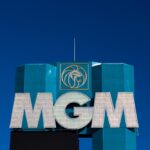MGM Resorts President Bill Hornbuckle thanks Nevada for prediction market clarity

After sportsbook operators DraftKings and FanDuel withdrew from Nevada earlier in the month, MGM Resorts International Chief Executive Bill Hornbuckle thanked the Nevada Gaming Commission for their stance against prediction markets.
In a hearing reported on by the Independent, Hornbuckle said, “The clarity helps us. Obviously, we have some work to do in some other states, and you’ve probably all followed that story closely.”
In addition, he noted that, in his opinion, prediction markets are akin to sports betting and should be subject to the same rules and regulations.
“It’s fascinating. It is without a doubt sports betting, full stop. And so we’re going to do everything we can to keep an eye on activity cases and ultimately see what we can do to make sure it comes in line with proper regulation and proper tax,” he added.
Hornbuckle has previously stated that MGM’s igaming arm, BetMGM, would be a “fast follower” if prediction markets were to make an impact on the sports betting market.
However, the uncertainty hasn’t stopped sportsbook rivals FanDuel and DraftKings from getting ahead of the curve and launching their own prediction market products.
Earlier in the month, DraftKings and FanDuel also announced their departures from Nevada following warnings from the state’s regulator that they could have their licenses revoked over launching prediction markets.
Abi Bray brings strong researching skills to the forefront of all of her writing, whether it’s the newest slots, industry trends or the ever changing legislation across the U.S, Asia and Australia, she maintains a keen eye for detail and a passion for reporting.
Verticals:
Sectors:
Topics:
Dig Deeper
The Backstory
Context for Nevada’s hard line on prediction markets
Nevada’s assertion that “prediction markets” fall under existing wagering laws did not emerge in a vacuum. The Nevada Gaming Control Board has been signaling a tougher posture for months, most visibly when it accepted the exits of FanDuel and DraftKings from the state after warning that contracts on sports events and other outcomes are wagers under Nevada law. That enforcement stance rippled beyond state lines as regulators in Ohio and Michigan issued cautions, New York lawmakers floated new guardrails and Massachusetts sued Kalshi. Nevada’s notice went further, saying an operator’s partnerships with firms offering event contracts outside the state could jeopardize its Nevada standing.
The message to licensees was unambiguous: nontraditional event contracts would be treated as sports betting, with all the regulatory and tax obligations that follow. Industry insiders read the move as a preemptive bid to keep the state’s tightly supervised ecosystem from being skirted by products that mimic betting without the same compliance. It also put pressure on national brands to pick a lane—either fully embrace Nevada’s regulated model or risk their credentials in the country’s most influential gaming jurisdiction.
That backdrop helps explain why a company steeped in Las Vegas operations would welcome clarity. For traditional sportsbook and casino operators, a single regulatory framework reduces uncertainty, even if it narrows room for experimentation. It also draws a bright line for how new betting-adjacent products will be evaluated in licensing decisions.
Rivals’ exits set the competitive stage
FanDuel and DraftKings did not simply shut down Nevada operations in a vacuum. They had already begun testing event-contract products that looked and felt like sports props, aiming to reach customers in states where full sportsbooks face higher barriers. Nevada’s stance complicated that calculus. In publicly documenting the departures, the regulator said it had become clear the companies intended to engage in unlawful conduct tied to sports event contracts, and that such behavior was incompatible with participation in Nevada’s industry. The episode, detailed here: FanDuel and DraftKings exit Nevada amid prediction market crackdown, underscored the risk that national experimentation can create local licensing consequences.
The retreat created immediate competitive implications on the Strip and statewide. In the short term, fewer rival brands active in Nevada can consolidate handle for incumbents. Longer term, the crackdown signals how innovation will be channeled—through approvals that look like traditional sportsbook expansions rather than offshoot prediction platforms. That matters for marketing spend, product road maps and the timing of new features across states with divergent rules.
BetMGM’s Nevada playbook gets sharper
Against that regulatory reset, BetMGM is moving to tighten its grip on MGM’s home turf. The operator is poised to assume operational control of MGM Resorts’ Las Vegas sportsbooks this summer, a step that centralizes decision-making and unifies the brand’s physical and mobile offerings in the state. The Nevada Gaming Commission has been reviewing the licensing mechanics after concerns surfaced over BetMGM’s prior role and oversight structure. Under the plan, BetMGM would run the sportsbook hub at Mandalay Bay, with eight other books operating as satellites, and the transition would land in a seasonal lull to minimize disruption.
Strategically, the takeover does two things. First, it resolves questions about who is truly in charge of risk, compliance and product within MGM’s footprint, which regulators want plainly documented. Second, it positions BetMGM to execute omnichannel features—such as a single wallet and more integrated parlays—across its nine Las Vegas books without the friction of split control. In a state where in-person books still anchor the experience, aligning the app and retail books can lift share, especially when two major national rivals have stepped back.
Digital growth dictates the next moves
The regulatory drama in Nevada intersects with MGM’s wider push to scale digital revenue. In remarks to investors, the company framed online growth as its top strategic focus for 2025, projecting BetMGM at roughly $2.5 billion in revenue and its broader interactive unit at about $500 million with Brazil on the horizon. The pivot includes parlaying Strip assets into demand, but also tightening marketing and accelerating product. Executives have already pulled back on splashy ad buys and funneled resources into features like single-game parlays and unified wallets to slow share losses in competitive states.
This matters for Nevada because the state’s definition of what counts as betting now directly shapes which products BetMGM can deploy and how fast. If prediction markets are formally treated as sports wagering, then offerings that look like event contracts must run through normal approvals, tax and oversight. That curbs whiplash for players and partners and lowers legal risk as MGM chases online growth in places like Maryland, New York and Illinois that may open to igaming. It also clarifies compliance expectations as BetMGM ramps up in Brazil, where onboarding and identity checks have slowed the market’s early push.
Beyond digital, MGM’s capital plan on the Strip—room refreshes at MGM Grand, future work at Aria and Mandalay Bay, and a city increasingly shaped by major league sports—feeds a steady pipeline of customers for BetMGM’s Nevada operations. A more synchronized app-and-retail experience becomes a competitive lever as stadium-driven foot traffic grows within walking distance of MGM’s properties.
Legal guardrails and responsible gaming pressures
The industry’s legal environment is moving in parallel with the policy debate over prediction markets. A federal appeals panel recently held that MGM could not be sued by a compulsive gambler over losses at its online casino, affirming that New Jersey law does not impose a duty of care on casinos toward problem gamblers. That ruling, summarized here: Third Circuit judge rules MGM Resorts is not liable for gambling addict’s losses, underscores how courts have generally rejected efforts to shift liability to operators absent unlawful conduct.
At the same time, MGM and its joint venture are expanding proactive safeguards, extending a national referral program with Kindbridge Behavioral Health and widening access to responsible gaming tools across jurisdictions. Details are here: MGM Resorts and BetMGM extend commitment to problem gambling research. The dual track—legal clarity that limits liability while boosting voluntary support—reflects an industry trying to manage reputational and regulatory risk as products become more ubiquitous. For Nevada regulators, robust responsible gaming protocols are increasingly a prerequisite as they evaluate new features and partnerships tied to event-based wagering.
Why the stakes are rising
Nevada’s warning shot at prediction markets did more than push two brands out of the state. It set terms for how innovation will be licensed, taxed and policed in the country’s most mature betting market. For MGM and BetMGM, the clarity reduces compliance ambiguity just as they consolidate sportsbook control on the Strip and accelerate digital growth elsewhere. For rivals, the episode is a reminder that state-by-state experimentation has limits, especially when products blur lines that regulators view as settled.
As new igaming states come online and Brazil evolves, operators will keep testing formats that engage fans without triggering fresh restrictions. Nevada’s stance suggests those bets will need to be placed inside the existing sportsbook box, not around it. The companies that best align product and compliance across jurisdictions will be positioned to capture share when the next wave of legal markets opens. In the meantime, a more centralized BetMGM in Las Vegas, paired with firm regulatory guideposts, sets the stage for measured growth rather than regulatory whiplash.








